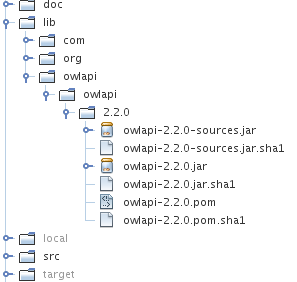It actually turns out to be pretty easy. Add something like this to your pom.xml:
<repository>
<id>local</id>
<name>Local repository in project tree</name>
<url>file:${basedir}/lib</url>
</repository>
Afterwards Maven will try to find a repository in the "lib" folder in your project. Let's assume you want this dependency in the local repository (hopefully something with better chosen IDs, but I decided to keep an existing pattern here):
<dependency>
<groupId>owlapi</groupId>
<artifactId>owlapi</artifactId>
<version>2.2.0</version>
</dependency>
What you need for this is a folder structure representing those three bits of information: groupId, artifactId and version (in that order), i.e.
lib/owlapi/owlapi/2.2.0. In that folder Maven expects at least four things: the JAR file, a matching POM file and the SHA1 sums for both. All files are named using the artifactId and the version, i.e. "owlapi-2.2.0.jar" for the JAR, the same for the POM but with the different extension.To get the SHA1 sums you can do this (assuming you run bash and have the sha1sum tool available):
for file in `ls`; do sha1sum $file > $file.sha1; done
If you are nice and add the sources (has to be a JAR with "-sources" in the name), then the result looks something like this:

The POM itself just contains the basic description (and possible dependencies):
<project>
<modelVersion>4.0.0</modelVersion>
<groupId>owlapi</groupId>
<artifactId>owlapi</artifactId>
<packaging>jar</packaging>
<name>OWLAPI</name>
<version>2.2.0</version>
<url>http://owlapi.sourceforge.net/</url>
<description>Java interface and implementation for the Web Ontology Language OWL</description>
<licenses>
<license>
<name>GNU Lesser General Public License, Version 3</name>
<url>http://www.gnu.org/licenses/lgpl-3.0.txt</url>
<distribution>repo</distribution>
</license>
</licenses>
<scm>
<url>http://sourceforge.net/svn/?group_id=90989</url>
</scm>
<dependencies>
</dependencies>
</project>
That's all there is -- next time you run Maven it should "download" the files from that location. Considering that the POM also provides a uniform way of storing licence, source and version information it is actually a quite useful approach for storing dependencies inside your project's space.
